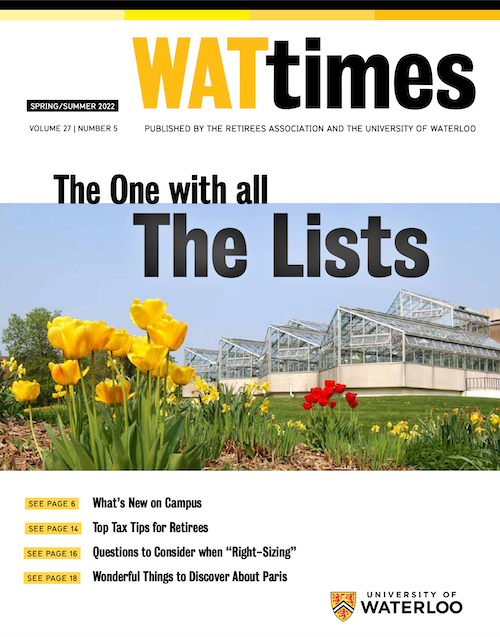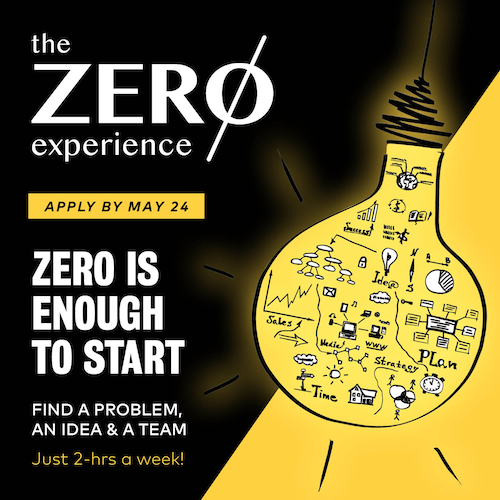Editor:
Brandon Sweet
University Communications
bulletin@uwaterloo.ca
The President's Forum in focus

More than 500 members of the University community tuned in Thursday morning to a President's Forum that discussed the recently-released President’s Anti-Racism Taskforce final report and its 88 recommendations to address racism at the University of Waterloo.
President Goel provided opening remarks before turning the proceedings over to Charmaine Dean, Vice-President, Research and International and PART Executive Designate, who gave some context-setting remarks about the events leading up to the completion of the PART report. Following Professor Dean's comments, Vice-President, Academic & Provost James Rush provided an update on actions the University has been taking in recent months on the anti-racism file.
Joining the University's senior leaders were Jean Becker, Associate Vice-President, Indigenous Relations and PART taskforce/implementation team member); Lili Liu, Dean, Faculty of Health and PART Working Group co-chair; Colleen Phillips-Davis, PART Working Group co-chair; and Angeline Ram, PART Working Group co-chair. President Goel, acting as moderator, engaged the panelists in a discussion about their experiences with PART and their perspectives on the University's next key steps.
The panelists then fielded questions submitted in advance and through the Teams Q&A chat feature on issues including hiring and career progression; supports for racialized employees; the processes PART used in developing its report; implementation of recommendations; and safe discourse around equity, among others.
If you were unable to attend the virtual forum, a video recording of the event will soon be available on the President's website and on the University of Waterloo's YouTube channel.
Baby, don't forget Campus Wellness's number

A message from Campus Wellness.

Booking an appointment for Campus Wellness services is going to become easier. Starting Friday, May 20, Campus Wellness will only have one phone number: 519-888-4096.
In the past, Campus Wellness had separate numbers for Health Services and Counselling Services. For students seeking help, having to navigate multiple numbers and lists of services creates unnecessary complications and can sometimes delay access to the services they really need. With the switch to one number, Campus Wellness will have new options to direct callers to Health Services, Counselling Services, Specialized Care, Occupational Health, as well as referrals, cashier, and appointment cancellations. This change seeks to provide a single point of contact to provide students with timely and accurate assistance.
We will have new promotional materials ready in late summer, which will be available to order. If you would like to order updated Campus Wellness postcards for fall semester, please fill out this form.
Remote classes affected students and teachers differently worldwide

As schools moved to a mode of emergency response teaching (ERT) at the beginning of the COVID-19 pandemic, there were distinct differences in the effect it had on students and teachers whether they were in developed or developing countries, a new study shows.
Using data science, researchers at the University of Waterloo analyzed the impact the shift to ERT in early 2020 had on both learning outcomes for students and teaching objectives for instructors. They collected data from developing countries, including Bangladesh, Malaysia and China, and developed countries, including the U.S., Canada, Germany and Spain.
The research team generated the data for their study through a combination of surveys and interviews with students and teachers. They then used data science methods and statistical analysis to sort through the massive amounts of information and draw conclusions.
“There were distinct differences in developed and developing countries,” said Enamul Haque, a PhD student in computer science at Waterloo and lead author of the study. “Students and teachers in developing countries experienced difficulties linked with infrastructure issues, such as lack of internet connectivity in some rural areas. This was also an issue in some rural areas in developed countries, but not to the same extent.”
The researchers also found that students in developing countries faced related difficulties around financial constraints. Because there was no reliable broadband internet connectivity, some students had to attend classes on their smartphones and use large amounts of data, which could be expensive.
In the developed countries they studied, students faced more difficulties related to distractions or to not having a dedicated space for their online learning inside their homes. For the teachers, they found that they consistently experienced a far higher workload when preparing and delivering classes remotely. In addition, for many teachers, it was their first time using a tech-only approach, which presented unique challenges, depending on their experience or whether they needed labs for hands-on teaching.
“One important take-away is that planning and preparation for moving to ERT are vital, and educational institutions that had plans in place did much better,” Haque said. “The experience of ERT can show cracks and weaknesses in educational systems where improvements can be made to increase resiliency and better support students.”
The new research from Haque and co-authors Tanvir Mahmud, Shahana Shultana, Iqbal H. Sarker and Md Nour Hossain, “A Tale of Two Zones: Pandemic ERT Evaluation,” was recently published as a chapter in the book Smart and Sustainable Technology for Resilient Cities and Communities.
What's open and closed this long weekend
The holiday that marks the unofficial start to the summer season is upon us. Victoria Day is a federal Canadian public holiday, celebrated on the last Monday preceding May 25. It’s also a statutory holiday in several provinces and territories across the country.
The holiday began as a celebration to honor Queen Victoria, whose birthday was May 24, 1819, and in 1901, the year of her death, the day was made a federal holiday.
Like all statutory holidays, what this means for Waterloo is a number of operational changes (and a few operations that stay the same) including:
- All W Store, W Store Essentials and W Print locations will be closed on Monday, May 23 for Victoria Day. All locations will re-open for regular business hours starting Tuesday, May 24.
- Most Food Services operations will be closed over the long weekend, with the exception of The Market at UWP, open Monday from 8:30 a.m. to 10:30 p.m. Check the Food Services Hours and Locations page for more information.
- The Student Life Centre and the Turnkey Desk will be open and operating 24/7 all weekend long. The Turnkey@DC location will be closed on Monday for the holiday.
- The Dana Porter and Davis Centre libraries will be open on Monday, May 23 from 12 noon to 6:00 p.m. Check the Library's hours of operation page for more details. Chat assistance will be available from 12 noon to 4:00 p.m. and email will be monitored from 12 noon to 6:00 p.m.
- The Physical Activities Complex and the CIF/FH on the north campus will be closed Sunday, May 22 and Monday, May 23.
As always, even on holidays, the Special Constable Service (ext. 22222, or 519-888-4911), and the central plant will monitor campus buildings (24-hour service and maintenance line, ext.33793) in case of problems or emergencies.
Enjoy the long weekend. The Daily Bulletin will return on Tuesday, May 24.
Latest issue of WATtimes available and other notes

The spring/summer edition of WATtimes, the newsletter published by the University of Waterloo Retirees Association, is now available on the UWRA website.
At almost 40 pages, this edition, entitled "The One with all the Lists," has something for everyone. "Please share WATtimes with fellow retirees who may not be members of the UWRA—and encourage them to join," says a note from the UWRA. "Send your feedback and suggestions for future WATtimes to uwra@uwaterloo.ca.”

Concept has issued a final call for applications for their Zero programs, Zero Work and Zero Experience.
Zero Work is a free weekend workshop and the application deadline is May 27. "Get clarity on what to do after you graduate, and how to get a job this term," says a note from Concept. "In partnership with CCA, it draws from research done at Stanford, MIT, and Yale to produce a single-weekend event that teaches you how to craft resumes, shows you how to network without feeling like a fraud, and helps you discover a career you actually want to do."
Information on the Zero Work program and how to register.

"The Zero Experience is a series value-packed weekly workshops, fireside chats with diverse guests (like NASA’s Mission Commander for the Hawaii simulation) to help you find a problem, an idea, and a team in just 2 hours a week," says Concept. "Plus if you get busy, you can leave at any point." The application deadline is Tuesday, May 24.
Information on the Zero Experience program and how to register.
The next PDAG seminar takes place today from 9:00 a.m. to 9:45 a.m. "Jira Service Management for Clients" will feature presenter Matt Harford and moderator Lawrence Folland. The event takes place on Microsoft Teams.
The seminar will explore the customer portal for Jira Service Management, how to interact with tickets, settings you can customize and control, talk about future plans, and answer any questions you may have.
Matt Harford is the Manager for the IST Service Desk team. He has been working on campus since 2009, initially as student staff. When he is not helping people at work, he likes to spend his time woodworking and enjoying the outdoors.
This session will be recorded and shared on MS Teams via the PDAG Channel.
Beyond the Bulletin Episode 128

The latest episode of the Beyond the Bulletin podcast is now live. Shawn Gilbertson, manager of course materials, discusses the shift to digital in the textbook market, what’s behind it, and what it means for students. Bruce Frayne will soon begin his tenure as the new dean of the Faculty of Environment. Twopop-up COVID vaccination clinics happen in May and June. And the Event Horizon Telescope Collaboration releases an image of Sagittarius A, a black hole at the centre of the Milky Way.
Link of the day
When and Where to get support
Students can visit the Student Success Office online for supports including academic development, international student resources, immigration consulting, leadership development, exchange and study abroad, and opportunities to get involved.
Instructors looking for targeted support for developing online components for blended learning courses, transitioning remote to fully online courses, revising current online courses, and more please visit Agile Development | Centre for Extended Learning | University of Waterloo (uwaterloo.ca).
Instructors can visit the Keep Learning website to get support on adapting their teaching and learning plans for an online environment.
Course templates are available within your course in LEARN to help you build and edit your content and assignment pages quickly.
The following workshops, webinars, and events are offered by the KL team (CTE, CEL, ITMS, LIB):
- Independent Remote Course Design Essentials, self-directed, continuous self-enrollment course in LEARN.
- Independent Blended Course Design (iBlend), self-directed, ongoing
- Copyright Overview for Waterloo Instructors and Staff - self-directed, continuous self-enrollment course in LEARN.
Supports are available for employees returning to campus. Visit IST’s Hybrid Work and Technology guidelines and workplace protocols to assist with the transition.
The Writing and Communication Centre has virtual services and programs to help undergrads, grad students, postdocs and faculty members with academic writing.
- Meet with writing advisors in one-to-one appointments to brainstorm, draft, revise, and polish. No time for an appointment? Try email tutoring for undergrads.
- Beat isolation and make writing progress at weekly Virtual Writing Cafés for grad students and faculty or PJ-Friendly Writing Groups for Undergrads.
- Take an online workshop or apply to our popular Dissertation Boot Camp program.
- Faculty can request custom in-class workshops for their courses, or the WCC can facilitate any existing workshops for student groups.
- Course-integrated support available. Attention faculty and instructors: The application form for Writing and Communication Centre course-integrated support is now available online. We offer five unique support streams for your courses including synchronous and asynchronous workshops and monitored discussion boards.
Co-op students can get help finding a job and find supports to successfully work remotely, develop new skills, access wellness and career information, and contact a co-op or career advisor.
The Centre for Career Action (CCA) has services and programs to support undergrads, grad students, postdocs, alumni, and employees in figuring out what they value, what they’re good at, and how to access meaningful work, co-op, volunteer, or graduate/professional school opportunities. Questions about CCA's services? Live chat, call 519-888-4047, or stop by our front desk in the Tatham Centre 8:30 a.m. to 4:30 p.m., Monday to Friday.
Drop-in to Warrior Virtual Study Halls on Wednesdays from 5:30 p.m. to 7:00 p.m. Come together in this virtual space to set goals and work independently or in groups each week.
Renison's English Language Institute continues to offer virtual events and workshops to help students practice their English language skills.
If you feel overwhelmed or anxious and need to talk to somebody, please contact the University’s Campus Wellness services, either Health Services or Counselling Services. You can also contact the University's Centre for Mental Health Research and Treatment. Good2Talk is a post-secondary student helpline available to all students.
The Library is open with expanded hours for access to book stacks, drop-in individual study space, bookable group study rooms, drop-in access to computers and printers, book pick-up services and IST Help Desk support. Librarian consultations, Special Collections & Archives and the Geospatial Centre are available by appointment. Full details on current services and hours are available on the Library’s COVID-19 Update webpage.
The Faculty Association of the University of Waterloo (FAUW) continues to advocate for its members. Check out the FAUW blog for more information.
The University of Waterloo Staff Association (UWSA) continues to advocate for its members. Check out the UWSA blog for more information.
The Sexual Violence Prevention and Response Office (SVPRO) supports all members of the University of Waterloo campus community who have experienced, or been impacted, by sexual violence. This includes all students, staff, faculty and visitors on the main campus, the satellite campuses, and at the affiliated and federated Waterloo Institutes and Colleges. For support, email: svpro@uwaterloo.ca or visit the SVPRO website.
The Office of Indigenous Relations is a central hub that provides guidance, support, and resources to all Indigenous and non-Indigenous campus community members and oversees the University's Indigenization strategy.
The Waterloo Indigenous Student Centre, based at St. Paul’s University College, provides support and resources for Indigenous students, and educational outreach programs for the broader community, including lectures, and events.
WUSA supports for students:
Peer support - MATES, Glow Centre, RAISE, Women’s Centre - Visit https://wusa.ca/services/wusa-peer-support to book an appointment either in person or online for the Fall term.
Food Support Service food hampers are currently available from the Turnkey Desk 24/7 in the Student Life Centre. Drop off locations are also open again in SLC, DC, DP, SCH and all residences.
Co-op Connection all available online. Check https://wusa.ca for more details.
Centre for Academic Policy Support - CAPS is here to assist Waterloo undergraduates throughout their experience in navigating academic policy in the instances of filing petitions, grievances and appeals. Please contact them at caps@wusa.ca. More information is available.
WUSA Student Legal Protection Program - Seeking legal counsel can be intimidating, especially if it’s your first time facing a legal issue. The legal assistance helpline provides quick access to legal advice in any area of law, including criminal. Just call 1-833-202-4571.
Empower Me is a confidential mental health and wellness service that connects students with qualified counsellors 24/7. They can be reached at 1-833-628-5589.
GSA-UW supports for graduate students:
The Graduate Student Association (GSA-UW) supports students’ academic and social experience and promotes their well-being.
Advising and Support - The GSA advises graduate students experiencing challenges and can help with navigating university policies & filing a grievance, appeal, or petition.
Mental Health covered by the Health Plan - The GSA Health Plan now has an 80 per cent coverage rate (up to $800/year) for Mental Health Practitioners. Your plan includes coverage for psychologists, registered social workers, psychotherapists, and clinical counselors.
Dental Care - The GSA Dental Plan covers 60 to 70 per cent of your dental costs and by visiting dental professionals who are members of the Studentcare Networks, you can receive an additional 20 to 30 per cent coverage.
Student Legal Protection Program - Your GSA fees give you access to unlimited legal advice, accessible via a toll-free helpline: +1-833-202-4571. This advice covers topics including housing disputes, employment disputes, and disputes with an academic institution.
The Graduate House: Open Monday to Tuesday 11:30 a.m. to 7:00 p.m. and Wednesday to Friday 11:30 a.m. to 9:00 p.m. We’re open to all students, faculty, staff, and community members. The Graduate House is a community space run by the GSA-UW. We’re adding new items to the menu. Graduate students who paid their fees can get discounts and free coffee.
When and Where (but mostly when)
Warriors vs. Laurier Blood Donation Battle. Join our “Waterloo Warriors” team on the Blood.ca website or app. #ItsInYouToGive
Equity and inclusion in industry sponsored contract research and commercialization consultations for researchers, Monday, May 9 to Friday, May 27. Sign up for an interview timeslot.
President's Forum on PART report, Thursday, May 19, 10:00 a.m., Microsoft Teams.
Victoria Day holiday, Monday, May 23, most University operations and buildings closed.
Discovery lab and world café,“The Future of Sustainable Transportation”, Tuesday, May 24, 10:30 a.m. to 12:30 p.m., STP 201 (Alumni Hall).
Master of Taxation, Virtual Information Session, full-time virtual info session, Tuesday May 24, 3:00 p.m., part-time virtual info session, Tuesday, May 24, 4:00 p.m.
NEW - Master of Business, Entrepreneurship and Technology – Information Sessions,Wednesday, May 25, 10:00 a.m. (full-time program) and 5:00 p.m. (part-time program), online webinars.
Online Workshop: You Don’t Know What You Don’t Know Part 1, Wednesday, May 25, 1:00 p.m. to 4:00 p.m. Register now.
Continuous Improvement Showcase, Thursday, May 26, 9:00 a.m. to 12 noon, Federation Hall.